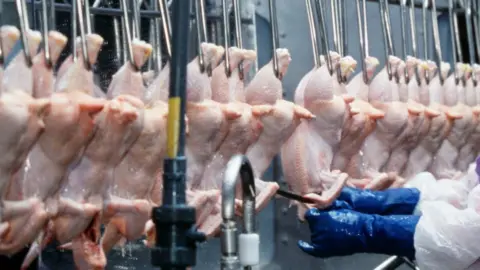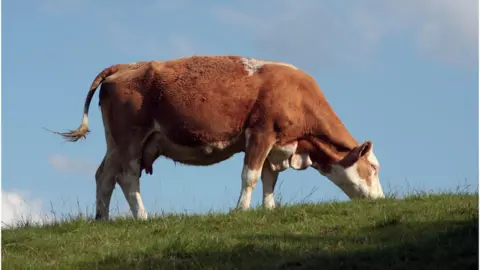Chlorinated chicken concern grows among Wales' farmers
 Getty Images
Getty ImagesConcern is growing among farmers and unions about the importation of lower quality food to the UK, post-Brexit.
An amendment to the Agriculture Bill was defeated in the House of Commons last month.
That was aimed at protecting British farmers from cheap imports not produced to UK standards.
The UK government had pledged to keep products such as chlorinated chicken from being imported.
On 4 June, Downing Street refused to stand by that promise.
Wales' farmers said they were frustrated there was not a high profile campaign in Wales highlighting the need to protect UK food standards post-Brexit.
Farmer Wyn Evans, of Bryn Iwan, Carmarthenshire, said: "After BSE in the 90s and foot-and-mouth disease in 2001, we have had to adhere to stringent measures in order to produce food in this country.
"We produce the safest, cleanest and highest quality products in the world, and now they're undermining this by accepting meat from other countries, which is not half as good."
Mr Evans, who supplies meat to Marks and Spencer, added: "We have to comply with strict regulations. That is why we have the best produce in the world."
Mr Evans is concerned families will buy cheaper food in the current financial climate and called on farming unions and the Wales Federation of Young Farmers Clubs to campaign together.
There is a campaign in England and Wales lead by the NFU and NFU Cymru, backed by chef Jamie Oliver.
"We need to let the public know what is happening and explain to them what is going on behind closed doors in London," he said.

The Farmers' Union of Wales said it was "appalled" an attempt to protect farmers and consumers had been blocked by the UK government.
"With the Agriculture Bill now due to be considered by the House of Lords it is essential that they do all they can to correct this position," a spokesman said.
The FUW said it had written to members of the House of Lords and MPs asking them to do "all they can."
NFU Cymru said it been fighting for standards for "a long time".
"Regrettably efforts to enshrine these standards in law through an amendment to the Agriculture Bill were not adopted by MPs," a spokesman said.
It now hopes those amendments will be made at the House of Lords.
NFU Cymru said it had not seen any of the detail of the proposed "dual tariff" system which would see tariffs imposed on imports in a bid to protect farmers.
"Imposing high tariffs still leaves the door ajar on these products coming in, as it does not amount to an actual ban," a spokesman said.
Britain "cannot" have a trade policy which requires farmers to compete against food produced to "lower standards", the union said.
More than 850,000 people have signed the NFU's petition for the UK government to ensure food imports were made to the same standards as UK products, it said.
The Welsh government said new deals must not create "an unlevel playing field" for UK farmers.
"Our focus is ensuring that UK government understands and takes on board the views of Welsh producers before and during negotiations," a spokesman said.
A UK Government spokesman said: "The UK is renowned for its high environmental, food safety and animal welfare standards.
"We have been clear that in all of our trade negotiations - including with the US in our first round of negotiations - that we will not undermine our high domestic environmental protection, animal welfare and food safety standards by ensuring in any agreement British farmers are always able to compete."
